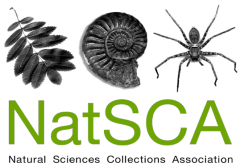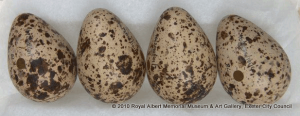At members' request NatSCA is re-running its popular Natural Science Collections and the Law Seminar.
Not sure what the Nagoya protocol is? Don't know what to do when someone offers you a collection of bird eggs? Wanting to charge for exhibitions or use your collections commercially but not sure where CITES restrictions apply? Then this seminar is for you.
Confirmed speakers include:
Chris Lyal from the Natural History Museum, London - The Nagoya Protocol
The Nagoya Protocol on Access to Genetic Resources and the Fair and Equitable Sharing of Benefits Arising from their Utilization to the Convention on Biological Diversity is an international agreement which aims at sharing the benefits arising from the utilization of genetic resources in a fair and equitable way. It entered into force on 12 October 2014.
Jana Horak - Head of Mineralogy & Petrology at Amgueddfa Cymru-National Museum Wales - Asbestos in your collections and radioactive geology
Asbestos in its natural form can be beautiful but it is as dangerous, if not more so, than processed forms. There are health and safety protocols that must be followed regarding its transport, storage and handling.
Rocks and minerals in your collections might be radioactive - Jana will explain what you are required to do to keep staff and visitors safe.
Karen Lancaster – The Home Office: Scheduled Drugs Legislation
Companies and individuals in England, Wales or Scotland need to apply for Home Office licences if they wish to produce, supply, possess, import or export ‘controlled drugs’. This can relate to museum collections including botanical, materia medica and some ethnographic material, therefore if you hold these types of collections you need to be aware of which ones require a license. This is a great opportunity to discuss current legislation and some of the concerns collection managers are currently facing with continuing austerity.
Nichola Burnett - CITES legislation
CITES (the Convention on International Trade in Endangered Species of Wild Fauna and Flora) is an international agreement between governments. Its aim is to ensure that international trade in specimens of wild animals and plants does not threaten their survival. Find out how this is applied in the UK and why it's relevant to museum collections.
Rob Child - Biocide legislation
There are some changes to the regulation of pesticides commonly used to protect collections from pest attack - Bob will provide an update.
Adam Whittaker - The Human Tissue Act
In the past, human remains were donated to museums and other collection holding institutions and natural science collections will ofter encompass this material. The Human Tissues Act provides guidance on whether a license is required to hold or display this material.
We are finalising speakers to cover the dos and don't of bird egg collections, European protected species and a couple of other topics are to be confirmed. We will post a full programme as soon as we can.
Tickets
Tickets can be purchased until 11.06.2016. However, if by 23.05.2015 the event is undersubscribed NatSCA reserves the right to cancel the event and refund all tickets. If requests for refunds are made after 23.05.2015 they will only be granted if we can fill your place.
- Non Members - £49 plus eventbrite booking fee
- Members - £29 plus eventbrite booking fee - to request your discount code or to become a member (£15 unwaged, £20 personal, £40 institutional) please click here or email NatSCA membership secretary Maggie Reilly - membership@natsca.org
Membership discount for institutional membership is limited to TWO places per event.
If your institution is unable to book through Eventbrite a paper booking form can be downloaded here
Catering
Teas and coffees will be provided but NatSCA will not be providing lunch. Please bring your own or pop to one of the many sandwich shops or cafes very near the univeristy. This worked well for the last seminar held here.
Getting there
Free parking is not available in the centre of Bristol or at the University. The nearest parking can be found at Jacobs Wells Road, Bristol, BS8 1EH (5 mins away) cost is £10 all day. The nearest station is Bristol Temple Meads (25 minute walk or short bus ride by the 8 or 9 bus). There are also 3 park and ride options, all information can be found here www.visitbristol.co.uk and www.bristol.gov.uk
When you reach the Wills Memorial Building, enter the foyer and look for signs for the event. The lecture room is G.25 but there should be someone to help you get there.
Contacts and Enquiries
- Membership and discount codes - NatSCA membership scretary Maggie Reilly at membership@natsca.org
- Payment, booking and invoicing - NatSCA treasuere Holly Morgenroth at treasurer@natsca.org
- Seminar content and general enquiries - training@natsca.org


